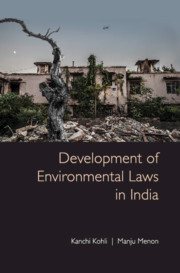Book contents
- Frontmatter
- Contents
- List of Tables
- Preface
- Acknowledgements
- Introduction: Environmental Laws and Development in India
- 1 Fundamentals of Environmental Law
- 2 Institutions Regulating India’s Environment
- 3 Forest Reservation and Conservation
- 4 Pollution Control and Prevention
- 5 Environmental Protection
- 6 Wildlife and Biodiversity Conservation
- 7 Ground and Surface Water Extraction
- 8 Land Acquisition
- 9 Climate Litigation and Policy Frameworks
- 10 Contemporary Environmental Law Reforms
- Index of Laws, Legal Cases and Government and Parliamentary Committee Reports
- General Index
3 - Forest Reservation and Conservation
Published online by Cambridge University Press: 31 July 2021
- Frontmatter
- Contents
- List of Tables
- Preface
- Acknowledgements
- Introduction: Environmental Laws and Development in India
- 1 Fundamentals of Environmental Law
- 2 Institutions Regulating India’s Environment
- 3 Forest Reservation and Conservation
- 4 Pollution Control and Prevention
- 5 Environmental Protection
- 6 Wildlife and Biodiversity Conservation
- 7 Ground and Surface Water Extraction
- 8 Land Acquisition
- 9 Climate Litigation and Policy Frameworks
- 10 Contemporary Environmental Law Reforms
- Index of Laws, Legal Cases and Government and Parliamentary Committee Reports
- General Index
Summary
INTRODUCTION
Forest governance in India is a complex interplay of several old and new laws at the state and central levels. The laws regulating forests can be traced back to the precolonial and colonial periods in India when forests were demarcated and managed as hunting grounds, private estates and timber plantations. Colonial laws granted powers to the British government to legally reserve forests and create new forests. After independence, the administration of these regions passed on to the Indian Forest Service. Forest departments attached to state governments adopted the powers and functions to ‘secure’ forests. Due to these legacies of top-down regulatory control of forests, the questions of historical ownership and uses of forests by common people, especially adivasis, have remained highly contested in forest governance.
Forests were introduced into the concurrent list of the Indian constitution through the 42nd amendment in 1976. This allowed both the central and state governments to enact laws on forests. In 1980, the central government passed a law to give itself the powers to grant ‘prior permission’ for the diversion and dereservation of forest land in India. These legal changes to forest governance have been understood as the central government's establishment of political control over the country's forest resources. This centralisation has also been justified as a means of protecting forests from exploitation at the state level.
While central and state governments claim ownership and control of forest lands and forest produce, tribal and forest-dwelling communities have mounted challenges to these claims. Communities who live in forest regions and are dependent on forests for their socio-economic and cultural purposes have resisted being alienated from forest governance. Since 2006, the regulatory jurisdiction on forests is not limited to the central and state governments alone but includes local self-governments such as gram panchayats, autonomous district councils and gram sabhas (village assemblies).
The setting of forest boundaries, transfer of forest land ownership or use and compensating forest loss are matters that have attracted intense legal scrutiny. While the Indian Parliament and the executive have shaped forest legislations in India, the judiciary has exerted a strong influence on forest policies and the administration of forests. Since 1995, the Supreme Court has retained a continuing mandamus on forest-related laws and decisions, especially through the Godavarman case which is discussed in detail in Section III of this chapter.
- Type
- Chapter
- Information
- Development of Environmental Laws in India , pp. 88 - 120Publisher: Cambridge University PressPrint publication year: 2021



